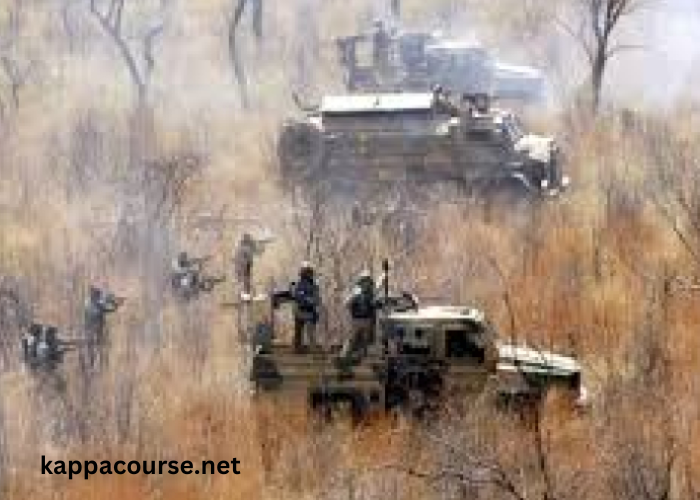Burkina Faso, a landlocked country in West Africa, has faced significant turmoil in recent years due to the rise of terrorism. The escalation of extremist violence has profoundly impacted the nation, straining its social, economic, and political fabric. This article delves into the roots of terrorism in Burkina Faso, the effects on its society, and the strategies employed to address the ongoing crisis.
The Roots of Terrorism in Burkina Faso
The rise of terrorism in Burkina Faso can be traced to several underlying factors. The country’s geographical location, nestled within the Sahel region of Africa, has made it vulnerable to the spread of extremist groups. The Sahel, characterized by its vast and arid landscape, has become a hotspot for terrorist activities due to its porous borders and challenging terrain.
The emergence of extremist groups in Burkina Faso is linked to broader regional conflicts. The instability in neighboring countries, such as Mali and Niger, has had a spillover effect, allowing extremist organizations to gain a foothold in Burkina Faso. Groups like Jama’at Nasr al-Islam wal Muslimin (JNIM) and Ansaroul Islam have exploited the region’s instability to expand their influence and conduct attacks.
Social and economic factors also play a significant role in the rise of terrorism. High levels of poverty, unemployment, and underdevelopment create an environment where extremist groups can recruit disillusioned individuals. The lack of access to education and economic opportunities contributes to a sense of disenfranchisement, making it easier for extremist ideologies to take root.
Additionally, political instability and governance issues have exacerbated the problem. Corruption, weak state institutions, and inadequate security infrastructure have hindered effective counter-terrorism efforts. These challenges have created a vacuum that extremist groups have exploited to further their agendas.
Impact on Society and Economy
The impact of terrorism on Burkina Faso’s society and economy has been severe. The violence has resulted in a significant loss of life, with countless civilians caught in the crossfire. Attacks on villages, schools, and markets have not only caused physical harm but also instilled fear and insecurity among the population.
The displacement of people is one of the most visible consequences of the ongoing conflict. Thousands of Burkinabe have been forced to flee their homes, seeking refuge in safer areas within the country or crossing into neighboring nations. This mass displacement has placed immense strain on local resources and infrastructure, creating humanitarian challenges and exacerbating existing vulnerabilities.
The economic impact is equally troubling. Terrorism has disrupted trade, agriculture, and other economic activities. Markets and businesses are often targeted, leading to economic losses and reduced livelihood opportunities for many individuals. The decline in economic activities affects government revenues and hampers development efforts, further entrenching poverty and underdevelopment.
Education has also suffered as a result of the ongoing violence. Schools have been attacked or closed due to security concerns, depriving children of their right to education and perpetuating a cycle of poverty and extremism. The long-term effects on the younger generation are likely to be profound, impacting the country’s future prospects.
Government and Regional Responses
In response to the growing threat of terrorism, the Burkinabe government has implemented several measures aimed at countering extremist activities and restoring stability. The government has sought international support and cooperation to bolster its counter-terrorism capabilities. Collaboration with regional and international partners, including the United Nations, the African Union, and neighboring countries, has been a key component of the strategy.
The establishment of the G5 Sahel Joint Force, a regional security initiative involving Burkina Faso, Mali, Mauritania, Niger, and Chad, represents a concerted effort to address the transnational nature of the threat. This force aims to improve coordination among member states and enhance collective security efforts in the Sahel region. The G5 Sahel Joint Force has received support from international partners, including France and the European Union, to strengthen its operational effectiveness.
On the domestic front, the Burkinabe government has focused on improving security infrastructure and intelligence capabilities. Efforts to enhance border security, strengthen law enforcement agencies, and improve community engagement have been central to the counter-terrorism strategy. The government has also sought to address the root causes of extremism by investing in development projects, education, and economic opportunities.
However, these efforts have faced significant challenges. Limited resources, ongoing political instability, and the vastness of the Sahel region complicate effective implementation. The ability of extremist groups to adapt and evolve in response to security measures presents an ongoing obstacle to achieving long-term stability.
Humanitarian and Developmental Responses
In addition to security measures, humanitarian and developmental responses are crucial in addressing the consequences of terrorism. International organizations, non-governmental organizations (NGOs), and humanitarian agencies play a vital role in providing aid and support to affected communities.
Humanitarian assistance includes the provision of food, shelter, and medical care to displaced individuals and communities. NGOs work to deliver essential services, such as clean water, healthcare, and education, to those affected by the crisis. The support of international donors and organizations helps mitigate the immediate impact of terrorism and addresses pressing humanitarian needs.
Developmental responses aim to address the underlying factors contributing to extremism. Efforts to promote economic development, improve access to education, and enhance governance are essential in building resilience and preventing further radicalization. By addressing the root causes of extremism, these initiatives contribute to long-term stability and peace.
The Role of Community Engagement
Community engagement is a critical component of counter-terrorism efforts. Building trust between communities and security forces is essential for effective prevention and response. Engaging local leaders, religious groups, and civil society organizations in counter-terrorism initiatives fosters cooperation and enhances community resilience.
Community-based programs focused on education, dialogue, and conflict resolution play a key role in countering extremist narratives. By promoting inclusive and participatory approaches, these programs help address grievances and build a sense of belonging among marginalized individuals.
Prospects for Peace and Stability
The path to peace and stability in Burkina Faso is complex and requires a multifaceted approach. Addressing terrorism involves not only military and security measures but also efforts to promote social cohesion, economic development, and good governance. A comprehensive strategy that integrates security, humanitarian, and developmental aspects is essential for achieving lasting peace.
The international community’s continued support and engagement are crucial in addressing the challenges faced by Burkina Faso. Collaborative efforts that focus on both immediate relief and long-term development can contribute to a more stable and secure environment.
Conclusion
Terrorism in Burkina Faso represents a profound challenge with far-reaching consequences. The rise of extremist violence has impacted the country’s society, economy, and governance, creating a complex and evolving crisis. Addressing this issue requires a concerted effort involving security measures, humanitarian assistance, and developmental initiatives. By tackling the root causes of extremism and fostering community resilience, Burkina Faso can work towards a more stable and peaceful future. The international community’s support and collaboration remain vital in achieving this goal and ensuring that the people of Burkina Faso can build a brighter and more secure future.







